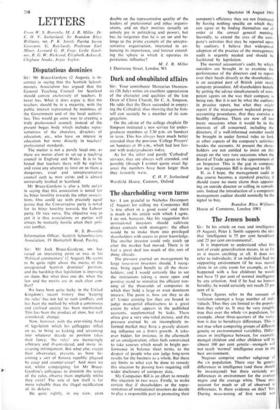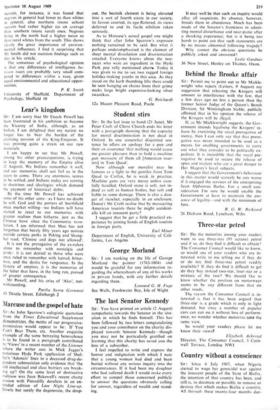The Jensen bomb
Sir: In his article on race and intelligence (9 August), Peter J. Smith supports the idea that 'intelligence is 75 per cent hereditary and 25 per cent environmental'.
It is important to understand what this sort of crude generalisation means, in so far as it means anything at all. It does not refer to individuals; if an individual had no supporting environment (if he was reared alone in an attic room for example, as has happened with a few children) he would not have 75 per cent of normal intelligence by any criterion. And if he had no human heredity, he would certainly not reach 25 per cent of it.
These figures refer to the amount of variation amongst a large number of indi- viduals. Thus they are limited to the popula- tion they refer to. It may be very roughly true that over the whole us population, for example, about three-quarters.of the varia- tion is due to hereditary differences. This is not true when comparing groups of different genetic or environmental variability. Differ• ences in intelligence between, for example. mongol children and other children will be almost 100 per cent genetic—mongols will not reach 'normal' intelligence even in the best environment.
Negroes comprise another subgroup of the us population. There may be genetic differences in intelligence (and these should be investigated) but there certainly are differences in environment for the average negro and the average white. These may account for much or all of observed IQ differences. Is there evidence on this? Yes. During mass-testing of first world war recruits, for instance, it was found that negroes in general had lower IQ than whites in general; also northern (more urban) recruits had rather higher IQS on average than southern (more rural) ones. Negroes Bing in the north had a higher mean IQ than rural whites from the south. This shows clearly the great importance of environ- mental influences. I find it surprising that Mr Smith did not mention findings such as this in his article.
The consensus of psychological opinion is that any differences of intelligence be- :wren races are probably very small com- pared to differences within a race, given equal environmental and educational oppor- tunities.
P. K. Smith University of Sheffield, Department of Psychology, Sheffield 10



































 Previous page
Previous page